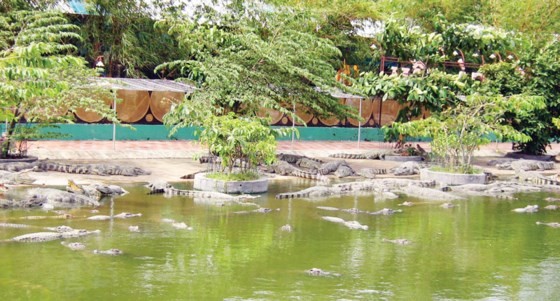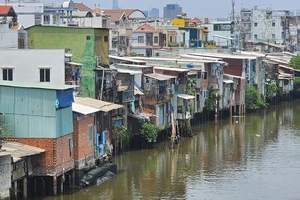
To increase the government’s management and prevent sales and consumption of wild animals and to facilitate crocodile and wild animal breeding in helping residents in poor outlying districts, People’s Committee in Ho Chi Minh City approved the program to raise & manage crocodile and wild animals in the city for the period 2016 - 2020.
The city strives to raise revenue of products made from crocodile to VND3.5 billion ($154,000) a hectare annually by 2020 as well as control diseases and curb unplanned breeding in inner city’s residential blocks.
City authority expected to reduce export of crude materials and multiple crocodile farms as per Convention on International Trade in Endangered Species of Wild Flora and Fauna (CITES).
Additionally, more investment in studying to improve quality and to diversify products with the aim of affirming Vietnamese brands in local and global markets would be carried out.
The program will set up support program including financial and technical aids to enterprises and households as well as contact with scientists to improve techniques and facilitate consumption. Plus, the government will enhance management on restaurants and producers which have used wild animal as material.
In the same time, city administration persuaded and forced illegal breeding farms to transfer to suburban districts.
At present, HCMC has 138 wild animal breeding farms mostly crocodile, snake and pythons for commercial purpose and big companies’ processing farms; of which, four crocodile farms are certified for export by CITES Vietnam.
Deputy Head of the municipal ranger department Lam Tung Que said weather condition in HCMC is favorable for breeding of snake, crocodile and varan; thus, breeding wild animal to improve poor residents’ income and develop the city’s economy is appropriate.
In 2016, HCMC exported 30,000 crocodiles at the cost of VND3 million each and 80,000 tons of varan skin at VND4 million each.
Nevertheless, the amount is not high because HCMC export rude materials. Subsequently, HCMC TPHCM has associated with Italian enterprises to process finished products for export at a higher price. Mr. Que fretted some farms will take wild-caught animal into their farm to legalize the origin of the animal for sales because rangers have discovered some cases like this.
Head of the Ranger Department Nguyen Xuan Luu stressed that legalization of wild-caught animals not only eradicate the country’s natural resources but also destroy Vietnamese breeding farms’ prestige and consumption because many countries require the transparency of products’ origins. Accordingly, to curb the problem, ranger officers ordered farm owners to report the quantity of animals periodically and pay unscheduled visits to farms for checking.
President of the Vietnam Animal Association Professor Dang Huy Huynh said Vietnam has been recognized as a nation with high biodiversity; hence, it needs to develop breeding of wild animal to improve people’s economic condition. Breeding the animal on the brink of extinction will help preserve them; for instance, deer in the brink of extinction has revived thanks to breeding and people make rich on breeding the animal, said Professor Huynh.
Yet, breeders of wild animal must have knowledge of animal’s habit and techniques to control diseases and protect the environment. Professor Huynh said that though the government allowed breeding wild animals, it has not issued the index of what wild animal can be bred to preserve gene sources and the quantity to facilitate management.
International CITES announced from September 18 to 22, it will work with Vietnam authority to pay visits to farms to inspect breeding and sales of wild animal. CITES will issue report of preventative measure on illegal sales in its meeting in November. CITES’ reports will greatly affect Vietnam’s business of wild animal.
























